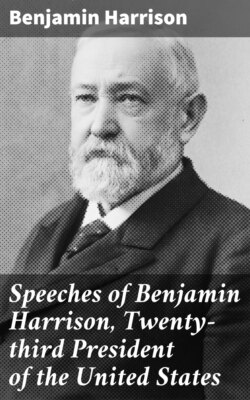Читать книгу Speeches of Benjamin Harrison, Twenty-third President of the United States - Benjamin Harrison - Страница 3
На сайте Литреса книга снята с продажи.
PREFACE.
ОглавлениеTable of Contents
It is not the purpose of this book to present a few selections of oratory, laboriously prepared and polished, or occasional flashes of brilliant thought. From such efforts, prepared, perhaps, after days of study and repeated revision, one can form but an imperfect idea of their author. Such a compilation might show the highest conceptions of the man, and evidence a wide range of thought and a surpassing grandeur of expression; but it would be but a poor mirror of the man himself in his daily life.
It is due to the people that the largest opportunity be given them to observe the character of their public servants, to come into closest touch with their daily thoughts, and to know them as they are—not when prepared for special occasions, but day after day and all the time. It is with this view that this collection of the speeches of President Harrison is offered to the public. It is a series of instantaneous photographs that have caught him unawares. The studied pose is wanting, but the pictures are true to life.
There are included the letter of acceptance, the inaugural address, the letter to the commercial congress, extracts from his last annual message to Congress, his patriotic message on the Chilian affair, and a few carefully prepared speeches, among them his notable addresses at the banquet of the Michigan Club, February 22, 1888, and before the Marquette Club at Chicago, March 20, the same year; also his celebrated speech at Galveston, in April last. All these are among the best models of statesmanlike thought and concise, forcible, and elegant expression. With these exceptions, the speeches presented were delivered during the presidential campaign of 1888, often four or five in a day, to visiting delegations of citizens, representing every occupation and interest, and during his tours of 1890 and 1891, when he often spoke eight or ten times a day from the platform of his car.
If these speeches contained no other merit, they would be remarkable in the fact that, while delivered during the excitement of a political campaign and in the hurry of wayside pauses in a journey by railroad, they contain not one carelessly spoken word that can detract from their dignity, or, by any possible distortion of language, be turned against their author by his political opponents. With no opportunity for elaborately studied phrases, he did not utter a word that could be sneered at as weak or commonplace. This fact is all the more noteworthy when we recall the dismal failures that have been made by others under like circumstances.
A spirit of exalted patriotism and broad statesmanship is apparent in every line; and notwithstanding the malignity of the partisan assaults that were made upon him, no words of bitterness—only terms of generous tolerance—characterize his allusions to his political opponents.
With a single notable exception, no thought of sameness or repetition is ever suggested. That exception was the central thought and vital principle that was at stake in the campaign. One marvels at his versatility in adapting himself to every occasion, whether he was addressing a delegation of miners, of comrades in war, or of children from the public schools; we admire the lofty thoughts and the delicious humor; but while he might soften in tender, playful greeting of children, or live again with his comrades the old life of tent and field, he never for one moment forgot the great principle whose banner he had been chosen to uphold. Protection of American industry was always his foremost thought—and how well he presented it! What an example to the politician who seeks by evasion or silence to avoid the questions at issue!
The book is therefore presented with the gratifying belief that a valuable service has been rendered in collecting these speeches and putting them in an enduring form, not only because they give the American people the most lifelike mental portrait of their Chief Magistrate, but because they are a valuable contribution to American literature.
In order to the best understanding and appreciation of an address, it is often necessary to know the circumstances in which it was delivered. Especially is this true when the address was made, as many of these were, to some particular organization or class of citizens or at the celebration of some important event. For this reason, as well as for their important historical value, an account is given of the occasion of each speech, including, as far as they could be learned, the names of the more distinguished persons who were present and took part in the exercises.
C. H.
Washington, D. C., February 20, 1892.
